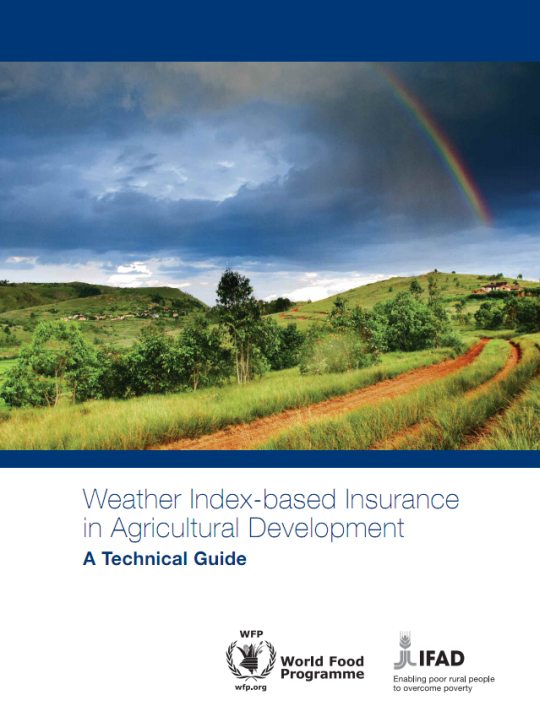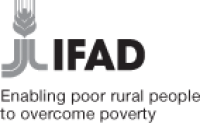Risk management in rural areas: IFAD to issue a technical guide for weather index-based insurance
Risk management in rural areas: IFAD to issue a technical guide for weather index-based insurance
Rome, 7 November 2011 – The International Fund for Agricultural Development (IFAD) and the World Food Programme (WFP) will release a technical guide titled ‘Weather Index-based Insurance in Agricultural Development: A Technical Guide for practitioners to help manage weather risks.
“Rural poor people in developing countries are vulnerable to a range of risks and constraints that impede their socio-economic development” said Kevin Cleaver, IFAD’s Associate Vice President. “Weather risk, in particular, is pervasive in agriculture. “This technical guide discusses weather index-based insurance, a class of insurance products that can allow weather-related risk to be insured in developing countries where traditional agricultural insurance may not always be feasible” he added.
Weather index-based insuranceresponds to an objective parameter, such as rainfall or temperature, at a defined weather station during an agreed period of time. The parameters of the insurance contract are set to correlate as closely as possible with the damages suffered by the farmer. All policyholders within the same area receive payouts based on rainfall measurements at the weather station close to their farms, eliminating the need for expensive, time-consuming loss assessments in the field.
IFAD has been working on index insurance as part of its commitment to reduce the vulnerabilities of poor rural smallholders and open their access to a range of financial services with a view to improving their livelihoods. Launched in 2008 with the support of the Bill and Melinda Gates Foundation, IFAD joined forces with the WFP to launch the Weather Risk Management Facility (WRMF).
The technical guide comes just prior to the 7th International Microinsurance Conference to be held in Rio de Janeiro, Brazil 8- 10 November. Hosted by the Munich Re Foundation and the Microinsurance Network, conference is critically important for international experts from insurance and reinsurance companies, international organisations, NGOs, development-aid agencies, academics, policymakers, regulators and supervisors. Over 400 experts from more than 50 countries aim to exchange experiences and discuss the challenges and opportunities of microinsurance.
This year, amongst other issues, the conference participants will discuss how microinsurance can be more effectively delivered to low-income households, and how public-private-partnerships can be mobilized to deliver effective microinsurance products against weather shocks such as drought.
The guide focuses on WII and translates the findings and experience of the WRMF to date into practical decision-making steps for donors and practitioners. It covers each phase of the WII project design and management process. The guide also shows how WII operates best as part of an integrated approach to risk management, when constraints such as lack of access to finance, improved seed, inputs and markets can be simultaneously addressed.
“While not a panacea for poverty, nor the sole solution for at-risk producers, WII shows great promise as a tool to reduce the severe effects of weather related shocks on people who depend on agricultural production for their livelihoods” said Cleaver.
###
The International Fund for Agricultural Development (IFAD), a specialized agency of the United Nations, was established as an international financial institution in 1977 as one of the major outcomes of the 1974 World Food Conference. The Conference was organized in response to the food crises of the early 1970s that primarily affected the Sahelian countries of Africa. The conference resolved that “an International Fund for Agricultural Development should be established immediately to finance agricultural development projects primarily for food production in the developing countries”. One of the most important insights emerging from the conference was that the causes of food insecurity and famine were not so much failures in food production, but structural problems relating to poverty and to the fact that the majority of the developing world’s poor populations were concentrated in rural areas.
IFAD is dedicated to eradicating rural poverty in developing countries. Seventy-five per cent of the world’s poorest people – 1.4 billion women, children and men – live in rural areas and depend on agriculture and related activities for their livelihoods.
Working with rural poor people, governments, donors, non-governmental organizations and many other partners, IFAD focuses on country-specific solutions, which can involve increasing rural poor peoples’ access to financial services, markets, technology, land and other natural resources.
IFAD’s mission is to enable poor rural people to overcome poverty.
###
> United Nations (UN).
 The United Nations was established on 24 October 1945 by 51 countries committed to preserving peace through international cooperation and collective security. Today, nearly every nation in the world belongs to the UN: membership totals 192 countries.
The United Nations was established on 24 October 1945 by 51 countries committed to preserving peace through international cooperation and collective security. Today, nearly every nation in the world belongs to the UN: membership totals 192 countries.
When States become Members of the United Nations, they agree to accept the obligations of the UN Charter, an international treaty that sets out basic principles of international relations. According to the Charter, the UN has four purposes:
- to maintain international peace and security;
- to develop friendly relations among nations;
- to cooperate in solving international problems and in promoting respect for human rights;
- and to be a centre for harmonizing the actions of nations.
###
* The above story is adapted from materials provided by United Nations (UN)
** More information at United Nations (UN)






















